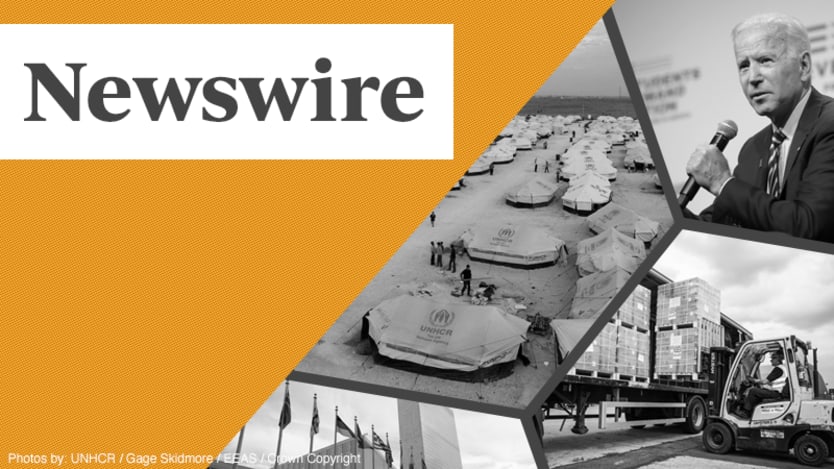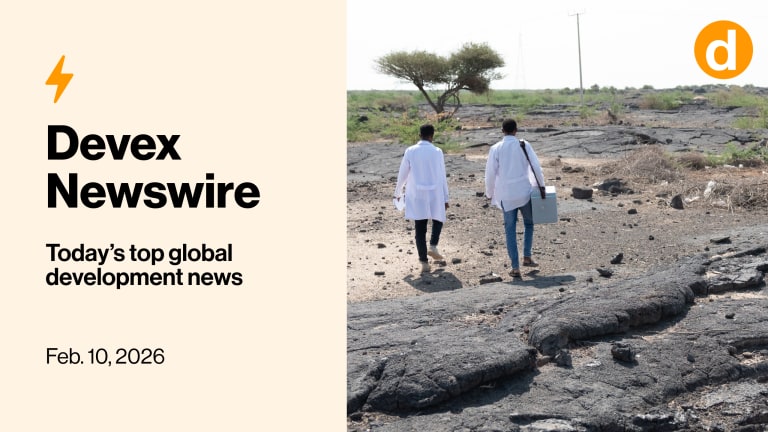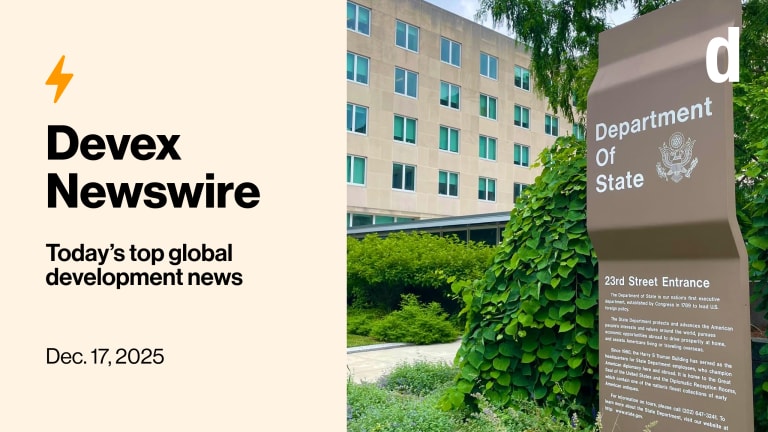
There are three things development professionals working internationally enjoy: beer, pizza, and gossiping about the local politics. That’s according to Stefan Dercon, who was policy adviser to the former United Kingdom foreign secretary, Dominic Raab, and before that chief economist at the Department for International Development.
Today we are also asking what Facebook knows about health information, and digging into the impact of research inequalities.
This is a preview of Newswire
Sign up to this newsletter for an inside look at the biggest stories in global development, in your inbox daily.
Dercon isn’t just talking about aid workers’ preference for the finer things in life. It's an analogy to describe how politics surrounds their work at all times, yet their daytime working environment does not always reflect this.
His new book “Gambling on Development” draws on his experience both as an economist and a government official to pen a new theory, which he describes as the “development bargain.”
He tells me that elite groups in low-income countries must decide to agree — for whatever reason — on a “development bargain” to achieve economic “takeoff.” How a development bargain comes about varies from place to place depending on the local political and economic context — and whether a country’s elites are willing to gamble their positions on a better future for their entire nation, rather than just themselves.
Development professionals should not work in a nation “without spending time trying to understand what's going on in this country and politics,” or else they will have “no way of contextualizing” whether a government official will ever do something they say they will do, or they are “just interested in your money,” he says.
Interview with Stefan Dercon: Why beer and pizza are integral to development
+ We will soon be publishing the second part of the Dercon interview, which will cover his experiences at the Foreign, Commonwealth & Development Office and the U.K. aid cuts, for which he had a front-row seat.
Cut and twist
Elsewhere in U.K. aid, the watchdog for development policy has praised government funding for the World Bank's International Development Association — not long after FCDO announced it would be “substantially” reducing aid funding to multilateral organizations.
“The World Bank’s International Development Association is an important source of concessional finance for low-income countries, whose ability to move at scale has proved itself in times of crisis,” says Tamsyn Barton, chief commissioner at Independent Commission for Aid Impact. “Our review found that the UK’s significant contributions to it provides good value for money.”
But there’s a twist to the typical aid cuts narrative of reduced aid funding sapping the U.K.’s clout: Officials from the World Bank and other donor countries told ICAI the funding cuts wouldn’t make much difference to the U.K.’s influence at the organization — a line that will most likely be used by a minister in the future.
Read: UK aid to World Bank praised as FCDO set to cut multilateral spending
+ Check out our page for the latest news and analysis on FCDO and the U.K. aid sector.
It’s complicated
Facebook has received criticism for not doing enough to counter misinformation about the COVID-19 pandemic on its platform. But at the same time, the social media giant has learned a lot about how people interact with health information, my colleague David Ainsworth reports. In the Philippines, for example, front-line health care workers were highly trusted, while in the United States, faith leaders are important communicators.
COVID-19: What the pandemic taught Facebook about public health (Pro)
+Save the date: On June 9 at 9 a.m. ET (3 p.m. CET), David will be talking to a panel of experts and business leaders from the world of global health supply chains. Devex Pro subscribers can register here. Not a Pro subscriber yet? You can sign up for a free trial to join.
In memoriam
The development community paid tribute to Daniel Graymore on Monday. The long-time U.K. government official was on secondment to the World Health Organization as director of strategic engagement and he was honored as an officer of the Order of the British Empire for services to international development last year.
Research inequality
“When you have well-represented communities at the table, you make decisions and cultivate ideas that will serve a wider variety of settings, individuals, and realities.”
— Dr. Allyn Auslander and Dr. Priyanka Naidu, Operation SmileWith health infrastructure, technology, and genetic studies based almost entirely in wealthy nations, Auslander and Naidu say today’s researchers and clinicians are incentivized to focus on problems and diseases prevalent in high-income nations — meaning research is focused disproportionately on people with European ancestry.
Opinion: Fix research inequalities to ensure safe surgery for millions
Against the grain
The world is more uncertain than it’s been in a long time, and that influences people’s thinking when it comes to looking for new jobs, particularly how their skills might be applied. But jobs coach Simone Anzböck tells Devex Careers Editor Justin Sablich that professionals should embrace taking on different roles, and that adaptability can pay off in more flexibility and freedom.
Watch: How to carve out a nontraditional career path (Career)
+ A Devex Career Account includes all the valuable tools you need to be successful in your globaldev job hunt. Sign up today and start your 15-day free trial.
In other news
Ten Pacific island nations have decided to delay their decision on China’s draft communique on regional trade and security over "concerns on specific issues." [Reuters]
A watchdog report claims that the EU has overstated the amount it has spent on climate projects in 2014-2020 by at least €72 billion ($77.35 billion). [EU Observer]
Only Denmark and the U.K. are on track to achieve net-zero carbon emissions by 2050, according to the Environmental Performance Index. [The New York Times]
Sign up to Newswire for an inside look at the biggest stories in global development.
Search for articles
Most Read
- 1
- 2
- 3
- 4
- 5








